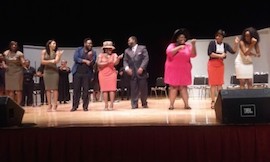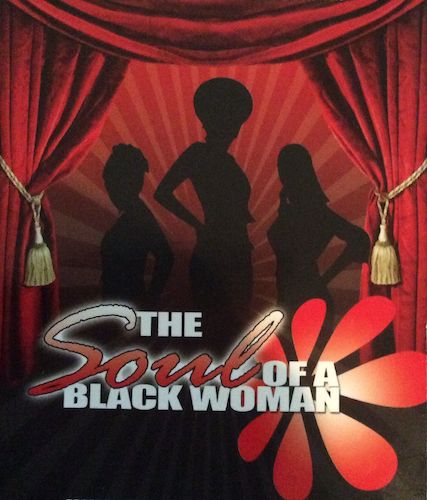Bittersweet Chocolate: “The Soul of Black Woman”


The following is a play review by a Stetson sophomore. The play was written, directed and produced by a local playwright who also composed and produced all the music. He is an accomplished professional both locally and in the entertainment industry nationwide. It is about a subject painfully poignant to Black History Month.
“The Soul of a Black Woman,” produced at Daytona’s Peabody Auditorium in November, showcased the talents of local playwright, Melvin C. Dawson Jr., who produced, directed, composed, and wrote the production. Dawson, also an influential pastor and accomplished author, has worked with theatre dignitaries including Vinnette Carroll, the first black woman to direct on Broadway; he also has an extensive background in gospel music, from recording to producing.
The music showcased local Volusia County vocal talent and range, taking audience members on a neo-soul journey to jazz and gospel influences.
It was not a knock-off Tyler Perry production. It was not another play featuring an emotionally dependent black woman and a black man in drag. Dawson painstakingly paid homage and respect to the poetry of black culture.
In other words, “Soul of a Black Woman” was not a disappointment.
The storyline centered on the dynamics of friendship between six black women: Vashti (Asia-Lige Arnold), Ramona (Lakesha Muhammad), Kiesha (Monica Arrington); CeCe (Trishawn Cadette), Jackie (Kelly McNair), and Diane (Kimberly Jenkins)—dubbing their clique “the chocolate girls.” This choice for main characters differentiated itself from the majority of modern plays.
Narrated by Soul of Consciousness, a sort of mystical and omniscient figure played by Bre Oliver, the play opens up with a “barbershop scene.” Despite that the scene is full of humor, it gives the audience an intimate portrait of what back men think of black women, and how that perception is vital to the misunderstanding of who black women are.
During monologues, characters “break the fourth wall” in numerous parts of the play, directly acknowledging their roles. Like Catholic confessionals, audience members were privy to private thoughts of each of the characters.
The protagonist, Vashti, is on a path for enlightenment through her writing. Her piece, aptly named for the play itself, is called “The Soul of a Black Woman.”
In her spoken word, she analyzes the lives of her five friends, and is determined to rise above their faults. Her ballad is poignant and powerful. Arnold’s voice drew the audience into her character’s journey to self-actualization.
However, it becomes more and more evident that she is judging her friends. She does not portray the depth of their characters, and makes callous assumptions such as: Ramona is “arrogant;” Diane is “a hypocrite;” Keisha is “loose,” and so on.
This raises an important question: just how close are these “chocolate girls?” Moreover, it offers an important social critique—do we truly know our friends? Do we truly know our own people?
Black women are rarely the stars of our own stories. In mainstream media, women of color are often dismissed as the “side characters.” However, the black entertainment world often relies on stereotypes for black women as well. We are gossips. We are loud. We are judgmental. We need a man to be validated.
Within the play, each black female character within the play represented these character archetypes: Vashti is a know-it-all; Keisha is a jezebel; Ramona is a cold-hearted career woman; Jackie is a desperate housewife; Diane is a judgmental church-lady; and CeCe is a smoking-gun.
However, the decision to build a story around stereotypical black female characters proved to be enlightening, instead of perpetuating. The play did not seek to actively defy stereotypes, but, instead, showed that there is more to black women than what meets surface glance.
Perfectly phrased in the final gospel song, “We don’t look like what we’ve been through.”
An important theme within the play is each character’s relationship with God, where the conflict in the play can be resolved by spirituality. In the last scene, the character Reverend Goodfellow (played by actual Reverend Calvin Callins,) says poignantly, “Adversity is the bridge to a relationship with God.”
The crux of the play is that there is no one, singular soul of a black woman—we are all inherently different, and that should be celebrated, not conformed.
“Life makes us camouflage our personal differences,” said Dawson when asked what inspired him to write the piece. “All women have different souls, and ultimately if we connect our souls to our Creator, we can come together from our different walks of life.”
For more information on the cast members and Dawson, visit The Soul of a Black Woman.
by Veronica Faison



